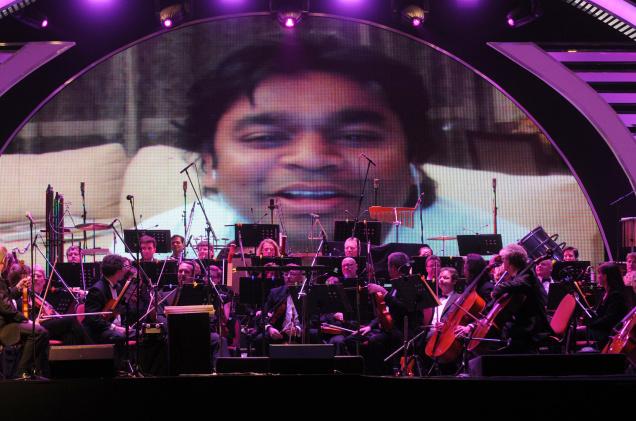 WHAT AN ORCHESTRA! Rahman’s collaboration with the Babelsberg group had its evocative moments. Photo: Sampath Kumar.G.P. / The Hindu
WHAT AN ORCHESTRA! Rahman’s collaboration with the Babelsberg group had its evocative moments. Photo: Sampath Kumar.G.P. / The Hindu
The Babelsberg German Film Orchestra playing A.R. Rahman’s compositions was a rich experience. The 100-odd musicians and the audience gathered in thousands were engaged in finding home in each other’s musical ideas, says Deepa Ganesh
Music Director of the Chicago Symphony Orchestra Daniel Barenboim said this in one of his interviews. “Where are you at home?” his interviewer asked. Barenboim said, “Wherever I make music.” He further explained: “My feeling of being at home somewhere is really a feeling of transition. Music is transition, too. I am happiest when I can be at peace with the idea of fluidity.”
The air was thick with curiosity at the “Classic Incantations” concert in the city on Sunday evening — the Babelsberg German Film Orchestra performing our own A.R. Rahman’s compositions. As the phenomenal hundred-odd orchestral group presented a rich aural and visual treat, I, perhaps like several others, was trying to catch glimpses of ragas Charukeshi and Patdeep in the Soprano, and when I found shades of Yaman emanating from the absolutely grand cello portions, I was truly elated.
An audience who is witness to a synthesis of such nature, is anxiously awaiting its entry point – most in the audience found it when the theme music of Rahman’s first film “Roja” (Cry of the Rose) was played. The piece was a melange of all the musical ideas that crisscross in “Roja” – from the soft romantic tones of “Kadal Rojave” to the more forceful mood of patriotism in “Tamilah Tamilah”. Navin Iyer, Rahman’s flautist, worked his own little details, and stole the show.
The opening piece, “Warriors of Heaven and Earth suite”, was subtle and serene. It gave you a complete sense of listening to a live, full blown orchestra with a lush violin section – complete with cellos, violas, sax, cymbals and harp. The piece reminded one of many earlier musical experiences, for instance, the luxuriant violin passages were reminiscent of Ilaiyaraja, and did the overall texture of tones bring Beethoven to mind?
The challenge in most such cross cultural collaborations is the articulation of the “other”. Matt Dunkley, the conductor, orchestrator and composer of Babelsberg executed this daunting task with remarkable elan and perfection. So much so that in the piece that was a tribute to the great maestros — which the audience loved — evergreen numbers like Madan Mohan’s “Aap ki nazarone samjha”, Ilaiyaraja’s “Sindhoora Poove”, Lakshmikant Pyarelaal’s “Suhana Safar” and Rahman’s “Kehna Hai Kya” sparkled with a refreshing emotive quality.
The compositions chosen were in themselves largely “Western” in idea – “Lord of the Rings suite”, “127 hours suite”, “Elizabeth: The Golden Age Suite” and several others. Nevertheless, it needs to be said to the credit of the conductor and his remarkably-talented orchestra, that the journey was constantly outward, seeing it in Rahman’s way and never an affirmation of one’s own identity. It would have perhaps been more interesting to see what new meanings would have emerged if the orchestra had played some of Rahman’s stunning compositions in the typical Indian repertoire, like his compositions in Vasanta or Natakuranji.
The outstanding soprano singer Kavitha Baliga and Bangalore’s vibrant Arun H.K., the audience favourite Asad Ali Khan on sitar, and the perfectly co-ordinated choir group, made the concert extremely lively and also provided some of the most intense moments.
It was a perfect orchestral experience. However, I am more an admirer of Rahman’s compositions of pan-Indian feel, than those of global sounds. It could have perhaps been richer if Rahman had built some artistic tension into the Babelsberg orchestra that was so immensely accomplished.
If your passion becomes your way of life, then geographical location is less important. Daniel Barenboim, who brought together Arab and Israeli musicians to celebrate the 250th anniversary of Goethe years ago, did agree that it was impossible to have “multiple identities” but remained emphatic that the sense of belonging to different cultures can only be enriching.
At the end of all, one didn’t feel a sense of belonging.
source: http://www.TheHindu.com / Arts> Music / Bangalore / by Deepa Ganesh/ January 30th, 2012